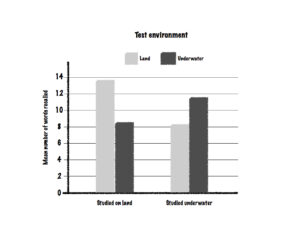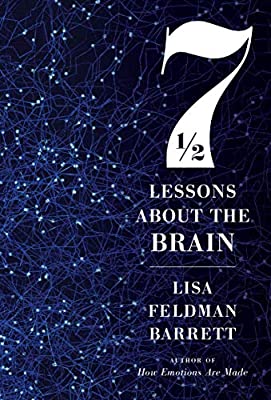At a Zoom event yesterday, Sam Gilbert from UCL discussed why many people have experienced memory problems over the last year and a half. The event was organized by UCL’s Institute of Cognitive Neuroscience and called “Mind the Brain”.
Sam Gilbert mentioned a classic experiment published in 1975 which I talked about in Brand esSense and his discussion resonated with many experiences in lockdown, although taking the implications of the 1975 experiment in a completely different direction. The experiment investigated the impact of context on memory and recall.
In Godden and Baddeley’s experiment, divers learnt lists of words in two different environments, on dry land and underwater. They were later asked to recall the words in either the original environment or in the alternative environment. Lists learnt underwater had higher recall underwater, and lists learnt on dry land had higher recall on dry land.
In other experiments, the experiments proved that the effect was caused by context-dependent memory and not related to the disruption of moving environments. The figure below summarizes the main finding.

The implications are one of the reasons that it is better to conduct market research in situ. For example, memory recall of alcohol brands is better in a bar than in a focus group discussion room and it is always wise to take a witness back to the scene of a crime.
Companies can these effects to their advantage. In The Experience Economy, Pine and Gilmore discuss a parking garage at O’Hare Airport operated by Standard Parking of Chicago. To help customers remember which floor they parked their car, they played a different tune at each level, and decorated the walls with the icons of different local sports franchises. They quote one local resident saying, “You never forget where you parked!”.
Seen from a different perspective, these findings suggest that without a variety of contexts, memories might be more difficult to distinguish from each other. For example, if you are in the same room all day every day, and even more extremely if you are sat at the same table in front of your laptop on Zoom calls. (Zoom has other issues too, such as increased distractions).
What can we do to mitigate these effects? Ideally, introduce as much mental variety as possible into different situations. At best, maybe go outside for a walk sometimes, and take your important phone call while you are walking in the open air. More simply, just move your desktop around from time to time, so you have a slightly different point of view. At the most basic level, change your Zoom background between video calls, so there is at least some differentiation in context.
The brain thrives on information that comes through different senses and in different contexts. If you are presenting, try and introduce some variety into your talks and use the different features in whatever software you use (there are many alternatives to Zoom). If you are listening, make sure you help important events stand out in your mind.
Variety is not just the spice of life, but something that can really help distinguish one memory from another.
REFERENCES
Godden, D & Baddeley, A Context-dependent memory in two natural environments: On land and under water, British Journal of Psychology, 66, pp 325-331
Pine, J & Gilmore, J (2011) The Experience Economy: Updated Edition, Harvard Business School Publishing, Boston





